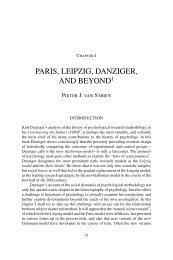The positivist repudiation of Wundt - Kurt Danziger
The positivist repudiation of Wundt - Kurt Danziger
The positivist repudiation of Wundt - Kurt Danziger
Create successful ePaper yourself
Turn your PDF publications into a flip-book with our unique Google optimized e-Paper software.
216 KURT DANZIGER<br />
tion <strong>of</strong> the variability <strong>of</strong> these organisms (itself open to scientific investigation) and had<br />
nothing to do with the alleged “private” nature <strong>of</strong> its data.44<br />
Titchener necessarily had to reject <strong>Wundt</strong>’s principle <strong>of</strong> psychic causality which<br />
formed the cornerstone <strong>of</strong> the latter’s system. “It is clear that we cannot regard one mental<br />
process as the cause <strong>of</strong> another mental process,” he states in his Textbook;45 the<br />
collection <strong>of</strong> psychological data by itself is analogous to old-fashioned natural<br />
history - it must lack the unity and coherence imparted by the kind <strong>of</strong> guiding principle<br />
that biology has in the form <strong>of</strong> the law <strong>of</strong> evolution. <strong>Wundt</strong>, <strong>of</strong> course, had <strong>of</strong>fered his<br />
laws <strong>of</strong> psychic process to provide just such unifying principle^.'^ For Titchener, however,<br />
“the explanatory principle for psychology must be looked for beyond, and not within, the<br />
world <strong>of</strong> dependent experience. Physical science, then, explains by assigning a cause;<br />
mental science explains by reference to those nervous processes which correspond with<br />
the mental processes that are under observation.” 47 If psychology was to regard mental<br />
data solely in their “dependent” aspect, if mental facts could never explain anything, and<br />
if the biological organism provided the only source <strong>of</strong> explanatory principles for psychology,<br />
then it is hardly surprising that psychologists listening to Titchener found<br />
themselves wondering why they should bother with mental data at all. Indeed, by dropping<br />
them they would do no more than follow the path <strong>of</strong> progress that Titchener had indicated<br />
- psychology would transcend the “natural history” level <strong>of</strong> mental observation<br />
and become a real science.<br />
11. CONSEQUENCES FOR PSYCHOLOGICAL THEORY<br />
<strong>The</strong> redefinition <strong>of</strong> the place and task <strong>of</strong> psychology entailed by the widespread<br />
adoption <strong>of</strong> the <strong>positivist</strong> philosophy <strong>of</strong> science had pr<strong>of</strong>ound repercussions on psy-<br />
chological theories in almost every subfield <strong>of</strong> the new discipline. Far from being merely<br />
a philosophical quibble, the redirection <strong>of</strong> scientific commitment had very specific con-<br />
sequences for psychological theory and research.<br />
Apperception<br />
<strong>The</strong> most obvious instance <strong>of</strong> this is provided by the theory <strong>of</strong> apperception which<br />
had held the central place in <strong>Wundt</strong>’s entire psychological system and which was simply<br />
buried by post-<strong>Wundt</strong>ian, Machian psychology. This involved a widespread redirection<br />
<strong>of</strong> psychological research and explanation. <strong>Wundt</strong>’s theory <strong>of</strong> the nature and process <strong>of</strong><br />
apperception combined two features that have been <strong>of</strong> far-reaching importance in the<br />
history <strong>of</strong> psychology. First, it expressed <strong>Wundt</strong>’s dynamic standpoint, the attitude<br />
which caused him to characterize his own system <strong>of</strong> psychology as “voluntaristic.” <strong>The</strong><br />
basis <strong>of</strong> mental life was to be found not in the passive response to impression, nor in the<br />
reproductive play <strong>of</strong> associations, but in the activity <strong>of</strong> selective attention and dis-<br />
criminative judgment. He conceived <strong>of</strong> this activity as a real force, an “aboriginal<br />
energy” which first expressed itself in impulsive movement. Second, the doctrine <strong>of</strong><br />
apperception expressed the decidedly “centralist” bias <strong>of</strong> <strong>Wundt</strong> as opposed to the<br />
“peripheralism” <strong>of</strong> some <strong>of</strong> his contemporaries. In accounting for the products <strong>of</strong> mental<br />
activity, whether in the form <strong>of</strong> voluntary movements or in the form <strong>of</strong> conscious con-<br />
tent, his inclination was to play down the role <strong>of</strong> sensation and to emphasize the role <strong>of</strong><br />
centrally generated processes. <strong>The</strong> central apperceptive process dominated<br />
everything - even in the sphere <strong>of</strong> movement, voluntary movement provided the basis<br />
for involuntary movement and not the other way around. For such alleged triumphs <strong>of</strong><br />
peripheralism as the James-Lange theory <strong>of</strong> emotion he had nothing but scorn.48





